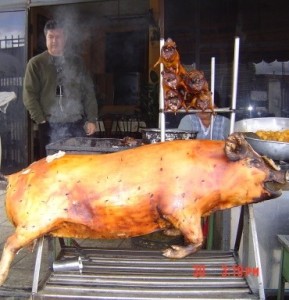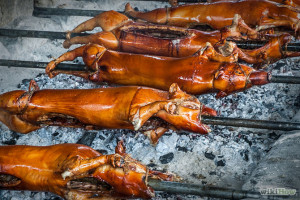Kapowsin Meats Inc., a Graham, Wash. establishment, is recalling approximately 11,658 pounds of pork products that may be contaminated with Salmonella I 4,[5],12:i:-, the U.S. Department of Agriculture’s Food Safety and Inspection Service (FSIS) announced today.
 The whole roaster hogs were produced between June 13, 2016 and July 15, 2016. The following products are subject to recall:
The whole roaster hogs were produced between June 13, 2016 and July 15, 2016. The following products are subject to recall:
* Varying weights of boxed/bagged Whole Hogs for Barbeque
The products subject to recall bear establishment number “EST. 1628M” inside the USDA mark of inspection. These items were shipped to various individuals, retail locations, institutions, and distributors in Washington.
FSIS was notified of an illness investigation in Washington on July 13, 2016. The Washington State Department of Health updated FSIS on July 19, 2016 of confirmed case-patients involved in an illness outbreak of Salmonella I 4,[5],12:i:-. Working in conjunction with the Washington State Department of Health, local health departments and the Centers for Disease Control and Prevention (CDC), FSIS determined that there is a highly probable link between whole hogs for barbeque from Kapowsin Meats and this illness cluster. Based on epidemiological investigation, three Salmonella I 4,[5],12:i:- case-patients have been identified with illness onset dates ranging from July 5, 2016, to July 7, 2016. Traceback investigation indicated that three case-patients consumed whole hog roasters for barbeque from Kapowsin Meats. At this time, it is not known if this outbreak strain has any drug resistance; results are pending.
This investigation is ongoing. FSIS continues to work with public health partners at the Washington State Department of Health, local health and the CDC on this investigation.
Consumption of food contaminated with Salmonella can cause salmonellosis, one of the most common bacterial foodborne illnesses. The most common symptoms of salmonellosis are diarrhea, abdominal cramps, and fever within 12 to 72 hours after exposure to the organism. The illness usually lasts 4 to 7 days. Most people recover without treatment. In some persons, however, the diarrhea may be so severe that the patient needs to be hospitalized. Older adults, infants, and persons with weakened immune systems are more likely to develop a severe illness. Individuals concerned about an illness should contact their health care provider.
FSIS and the company are concerned that some product may be frozen and in consumers’ freezers.
Consumers who have purchased these products are urged not to consume them. These products should be thrown away or returned to the place of purchase.




